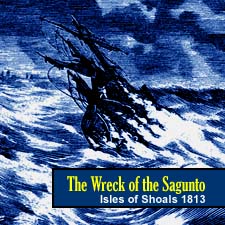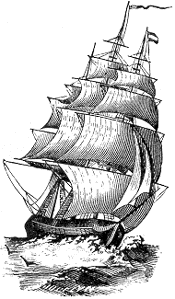| Shipwreck on the Shoals |

SEACOAST POETRY
Two 19th century poets tell the story of the same shipwreck at the Isles of Shoals. Celia Thaxter’s poem appears to purposely provide a female answer to the masculine tragedy by James Kennard. Here side-by-side for the first time, they offer contrasting views of a mysterious event in Seacoast history.
READ: Much more on the Spanish Sailors
TWO POEMS ON THE WRECK OF THE SPANISH SAGUNTO
JUMP TO:
The Spanieards Graves
Wreck of the Seguntum
 Are 14 shipwrecked Spanish sailors really buried on Smuttynose Island? Recent research shows no definitive evidence that the Seguntum (also "Sagunto"), sailors were buried on the Isles of Shoals in January 1813. But early records indicate that something happened -- and poets James Kennard Jr. and Celia Thaxter have turned the legend to poetry.
Are 14 shipwrecked Spanish sailors really buried on Smuttynose Island? Recent research shows no definitive evidence that the Seguntum (also "Sagunto"), sailors were buried on the Isles of Shoals in January 1813. But early records indicate that something happened -- and poets James Kennard Jr. and Celia Thaxter have turned the legend to poetry.
Although Thaxter told a friend, she came up with the idea for "Spaniards' Graves" (1865) while she worked "among the pots and kettles" of her home, we wonder. It is not unlikely that she had read an earlier poem "Wreck of the Seguntum" (1849) by Portsmouth poet James Kennard, Jr. Kennard was born in Portsmouth in 1815, attended school there and spent much of his time studying and reading at the Portsmouth Athenaeum. He suffered from a lame left knee which, from a short memoir by a friend, appears to have been bone cancer. He died at age 32. His work, as far as we can determine, is limited to a few poems that have not been widely read or reprinted since 1865.
Celia Thaxter appears to answer Kennard 's poem as she stands at the grave site meditating. She relates the action too, but focuses more on the loss of the living, connecting herself with the unknown Spanish widows. Thaxter's popular poem has often been reprinted, but this is the first time the two have appeared together.
SEE ALSO:
Smuttynose Island Murders
Wreck at Rivermouth
Sources: Celia Thaxter, Among the Isles of Shoals, Boston (1873), Jane Vallier, Poet On Demand, Peter E. Randall, Publisher (1991), Selections from the Writings of James Kennard, Jr., Boston (1849). Copyright © 2006 by J. Dennis Robinson. Originally published here in 1999.
CONTINUE with The Spanieards Graves
TWO SHIPWRECK POEMS (continued)
THE SPANIEARDS GRAVES
At the Isles of Shoals (1865)
By Celia Thaxter
O sailors, did sweet eyes look after you
The day you sailed away from sunny Spain?
Bright eyes that followed fading ship and crew,
Melting in tender rain?
Did no one dream of that drear night to be,
Wild with the wind, fierce with the stinging snow,
When on yon granite point that frets the sea,
The ship met her death-blow?
Fifty long years ago these sailors died:
(None know how many sleep beneath the waves)
Fourteen gray headstones, rising side by side,
Point out their nameless graves,-
Lonely, unknown, deserted, but for me,
And the wild birds that flit with mournful cry,
And sadder winds, and voices of the sea
That moans perpetually.
Wives, mothers, maidens, wistfully, in vain
Questioned the distance for the yearning sail,
That leaning landward, should have stretched again
White arms wide on the gale,
To bring back their beloved. Year by year,
Weary they watched, till youth and beauty passed,
And lustrous eyes grew dim and age drew near,
And hope was dead at last.
Still summer broods o'er that delicious land,
Rich, fragrant, warm with skies of golden glow:
Live any yet of that forsaken band
Who loved so long ago?
Spanish women, over the far seas,
Could I but show you where your dead repose!
Could I send tidings on this northern breeze
That strong and steady blows!
Dear dark-eyed sisters, you remember yet
These you have lost, but you can never know
One stands at their bleak graves whose eyes are wet
With thinking of your woe!
First published in The Atlantic, April 1865 and had appeared in numerous versions, studies and anthologies since.
CONTINUE with The Wreck of the Seguntum
TWO SHIPWRECK POEMS (continued)
WRECK OF THE SEGUNTUM
By James Kennard Jr. (1849)
Original Editor's Note in 1865: The Spanish ship "Seguntum"
was wrecked on the Isles of Shoals in the winter of 1813,
and all hands on board perished.
Fast o'er the seas, a favoring breeze
The Spanish ship had borne:
The sailors thought to reach their port
Ere rose another morn.
As sank the sun, the bark dashed on,
The green sea cleaving fast;
Ah ! little knew the reckless crew
That night should be their last.
They little thought their destined port
Should be the foaming surge;
That, long ere morn again should dawn,
The winds should wail their dirge!
As twilight fades, and evening shades
Are deepening into night,
The sky grows black, and driving rack
Obscures the starry light.
And loudly now the storm-winds blow,
And through the rigging roar;
They find, too late to shun their fate,
They're on a leeward shore.
'Mid snow and hail they shorten sail;
The bark blows 'neath the blast;
And as the billows rise and break,
She's borne to leeward fast.
The straining ship drives through the seas,
Close lying to the wind;
The spray, on all where it doth fall,
Becomes an icy wind.
It strikes upon the shrinking face
As sharp as needles' prick;
And ever, as the ship doth pitch,
The shower comes fast and thick.
And with it comes the driving snow,
Borne on the bitter blast:
The helmsman scarce the compass sees,
It flies so keen and fast.
A sound of fear strikes on the ear:
It is the awful roar
Of dashing breakers, dead ahead,
Upon the rocky shore!
"Wear ship ! hard up, hard up your helm!"
Aloud the captain cries:
Slowly her head pays off and now
Before the wind she flies.
Now on the other tack, close braced,
She holds her foaming course:
Short respite then ! too soon again
Are heard the breakers hoarse!
Ahead, to windward and to lee,
The foaming surges roar:
"O Holy Virgin ! save us now,
And we will sin no more!"
"We vow to lead a holy life;"
Too late ! alas, too late!
Their vows and plaints to imaged saints
Cannot avert their fate.
They strike a rock ; O God ! the shock!
They vanish in that surge!
Through mast and shroud the tempest loud
Howls forth a dismal urge.
Their lives not one to greet the sun,
Or tell the tales at home;
A winding-sheet for sailors meet,
The waves around them foam.
The storm is o'er : the rocky shore
Lies strewn with many a corpse,
Disfigured by the angry surf
That is still murmuring hoarse.
And thus the Spanish crew were found,
Cast on those barren isles;
There, in unconsecrated ground,
They rest them from their toils.
No mourners stood around their graves,
No friends above them wept;
A hasty prayer was uttered there, --
Unknown, unknelled, they slept.
Original Editor's 1865 Footnote: Their graves are still to be seen on one of the Isles of Shoals. These islands lie off the harbor of Portsmouth, N.H., nine miles from the mouth of the Piscataqua.
From "Poets of Portsmouth", Edited by Aurin M. M. Payson and Albert Laighton, 1865. Appeared originally in "The Knickerbocker" in February 1847, and in "Selections from the Writings of James Kennard, Jr.", Boston, 1849
